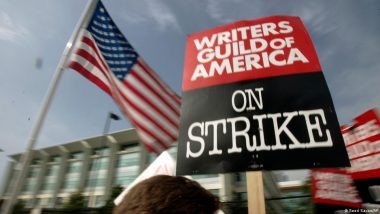The current strike is expected to disrupt some TV programming and potentially lead to delays in the fall TV season. The last WGA strike, in 2007-2008, cost the California economy around $2 billion.Thousands of film and television writers in Hollywood are set to go on strike following a failure to reach an agreement with major studios over pay and working conditions, especially in the streaming era.
Also Read | Delhi Excise Policy Case: AAP Leaders Raghav Chadha, Sanjay Singh Named in ED Charge Sheet.
The Writers Guild of America (WGA), which represents around 11,500 writers in Los Angeles, New York, and other locations, will stage its first work stoppage in 15 years after negotiations with companies, such as Netflix and Disney, ended without a deal.
The move will see picketing outside Hollywood studios starting Tuesday afternoon.
"We have not reached an agreement with the studios and streamers. We will be on strike after the contract expires at midnight," the Writers Guild of America (WGA) said in an email to members obtained by the AFP news agency.
"The survival of our profession is at stake," it said.
The current strike is expected to disrupt some TV programming and potentially lead to delays in the fall TV season. The last WGA strike, in 2007-2008, cost the California economy around $2 billion (€1.82 billion).
WGA sticking points
The WGA said in a statement that the companies' behavior "has created a gig economy inside a union workforce" and contributed to the "devaluing the profession of writing."
The primary sticking points for the WGA are proposals by the studios that would require a show to be staffed with a certain number of writers for a specific time, whether needed or not.
TV shows now tend to hire fewer writers, for shorter durations, to script series.
According to Guild statistics, half of TV series writers now work at minimum salary levels, compared to one-third in the 2013-14 season, while the median pay for writers at the higher writer/producer level has fallen 4% over the last decade.
Another issue is how writers are paid for their work on streaming shows, which often remain on platforms for years after they were written.
Currently, writers receive a fixed annual payout for streaming shows, regardless of how successful the show becomes. This stands in contrast to the traditional payment method of residuals, where writers receive payment each time their material is reused, such as in TV reruns or DVD sales.
The writers have also demanded safeguards against the use of artificial intelligence (AI) in generating new scripts based on their past work and to ensure that they are not asked to rewrite drafts created by AI.
The Guild contends that the studios' responses to its proposals have been wholly insufficient.
Industry fears ripple effect
The strike is being driven by the impact of the streaming TV boom, leading to a decline in TV ad revenue and pressure on media companies to make their streaming services profitable after investing heavily in programming to attract subscribers.
The studios, represented by the Alliance of Motion Picture and Television Producers (AMPTP), have offered "generous increases in compensation," according to a statement issued by the group late on Monday.
However, the two sides were unable to reach an agreement.
Several other Hollywood unions representing actors and directors have expressed solidarity with the striking writers, leading to fears over significant ripple effects.
ss/sms (Reuters, AP, AFP)
(The above story first appeared on LatestLY on May 02, 2023 02:30 PM IST. For more news and updates on politics, world, sports, entertainment and lifestyle, log on to our website latestly.com).













 Quickly
Quickly


